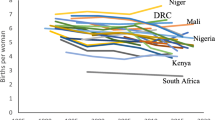Abstract
This article presents research findings on the question of whether the monetization of non-emergency food aid has adversely influenced national family planning program efforts in Honduras. Women receiving food aid in the form of cash coupons are compared in the study with women receiving food rations and a third group of women with similar characteristics who were not food aid recipients on three types of outcomes: recent fertility, fertility preferences, and contraceptive use. The health facilities where study subjects received health/family planning services and food aid benefits were also compared to assess possible adverse cross-program effects on family planning service delivery. A ‘sample selection’ model was used in the analysis to control for unobserved differences between comparison groups. No compelling evidence for adverse demand- or supply-side effects of monetized food aid on family planning efforts was observed. The most striking study finding was the extremely high level of unmet need for family planning.
Similar content being viewed by others
References
Angeles, G., Mroz, T. & Guilkey, D. (1995). Purposive program placement and the estimation of program effects: The impact of family planning programs in Tanzania. Chapel Hill: Carolina Population Center, the EVALUATION Project.
Becker, G.S. (1960). An economic analysis of fertility. In Universities – Nationald Bureau Committee for Economic Research (ed.), Demographic and economic change in developed countries, pp. 209–231. Princeton, NJ: Princeton University Press.
Duncan, G. & Hoffman, S. (1990). Welfare benefits, economic opportunities, and out-of-wedlock births among black teenage girls, Demography27(3): 519–536.
Ellwood, D. & Bane, M. (1985). The impact of AFDC on family structure and living arrangement. In R. Ehrenberg (ed.), Research in labor economics, 7: 165–195. Greenwich, CN: JAI Press.
Heckman, J. (1979). Sample selection bias as a specification error, Econometrica47: 153–161.
Hubacher, D. Suazo, M., Terrell, S. & Pinel, M. (1996). Examining the increasing prevalence of traditional contraceptive methods in Honduras, International Family Planning Perspectives22(4): 163–168.
INCAP –Instituto de Nutricion de Centro America y Panama (1993). Evaluacion del proyecto bono materno-infantil del programa de Asignacion Familiar (PRAF). Tegucigalpa, Honduras: INCAP.
Jackson, C. & Klerman, J. (1994). Welfare, abortion, and teenage fertility. Santa Monica, CA: RAND Corporation, Working Paper Series, DRU-428-NICHD.
Janowitz, B.S. (1976). The impact of AFDC on illegitimate birth rates, Journal of Marriage and the Family38: 485–494.
Lundberg, S. & Plotnick, R. (1990). Effects of state welfare, abortion, and family planning policies on premarital childbearing among white adolescents, Family Planning Perspectives22: 246–251.
Lundberg, S. & Plotnick, R. (1995). Adolescent premarital childbearing: Do economic incentives matter?, Journal of Labor Economics13: 177–201.
Moore, K. & Caldwell, S. (1977). The effect of government policies on out-of-wedlock six and pregnancy, Family Planning Perspectives9: 164–169.
Sanghvi, T.G., Rogers, B.L., Tatian, P., Behrman, J.R., Calderone, M., Crelia, S. & Garcia, M. (1995). The impact of food and cash transfers on health and nutrition: An evaluation of the Bonos (BMI) and PL 480 Title II MCH Programs in Honduras. Bethesda, MD: Latin America and Caribbean Health and Nutrition Sustainability Project.
Schultz, T.P. (1994). Marital Status and fertility in the United States:Welfare and labor market effects, Journal of Human Resources29(2):637–669.
World Bank (1992). Nutrition and health project: Staff appraisal report. Human Resources Operations Division, Country Department II, LAC Regional Office, Report No.11235-HO.
Author information
Authors and Affiliations
Rights and permissions
About this article
Cite this article
Magnani, R.J., McCANN, H.G., Hotchkiss, D.R. et al. The effects of monetized food aid on reproductive behavior in rural Honduras. Population Research and Policy Review 17, 305–328 (1998). https://doi.org/10.1023/A:1005926905494
Issue Date:
DOI: https://doi.org/10.1023/A:1005926905494




